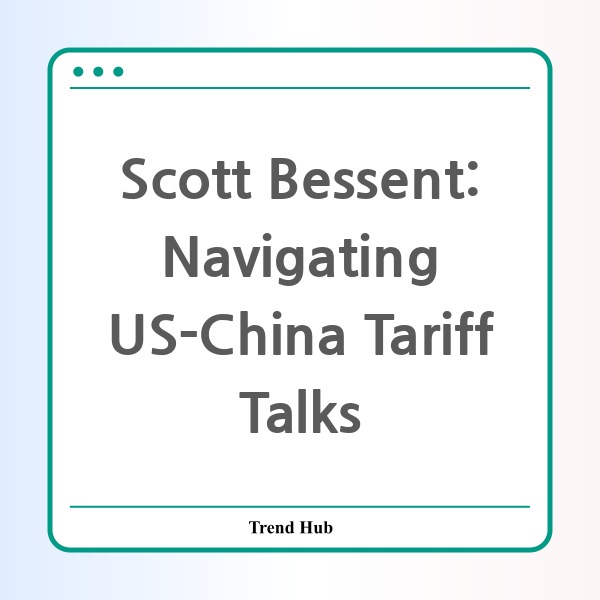* This website participates in the Amazon Affiliate Program and earns from qualifying purchases.

Is the US-China Trade War Finally Easing?
As tensions between the United States and China continue to impact global trade dynamics, the spotlight is firmly on Scott Bessent, the U.S. Treasury Secretary, in his pivotal role during the upcoming tariff negotiations. With discussions set to begin in Geneva, there is a palpable sense of urgency to address the economic strain felt by both nations and to find common ground.
The Trump administration is reportedly strategizing a significant reduction in tariffs, aiming for a preliminary target of dropping them below 60%. This figure is not just a benchmark; it represents a tangible step towards de-escalation and a move that could potentially relieve economic pressures on industries reliant on Chinese imports.
The backdrop of these negotiations is as complex as it is critical. Both the U.S. and Chinese economies are experiencing the adverse effects of their ongoing trade conflict, and the stakes are higher than ever. The discussions, led by Bessent and Chinese Vice Premier He Lifeng, are crucial for setting a tone of cooperation in an otherwise tense relationship.
During a recent congressional hearing, Scott Bessent described the upcoming talks as "negotiations," emphasizing the importance of this dialogue. Notably absent from these discussions will be White House trade adviser Peter Navarro, a figure often associated with a more aggressive trade posture. Bessent’s straightforward acknowledgment of the current status of negotiations reflects a commitment to transparency and a willingness to engage in constructive dialogue.
But what does this mean for American consumers and businesses? A reduction in tariffs could lead to lower prices on imported goods, which is a welcome relief for many. Moreover, by easing restrictions on rare earth elements—vital components across a range of industries from electronics to clean energy—the U.S. could significantly benefit economically.
While the talks are set to take place over only two days, the outcomes are expected to reverberate far beyond Geneva. If successful, they could pave the way for further discussions aimed at more comprehensive solutions to long-standing trade issues. However, as history has shown, negotiating trade agreements is rarely straightforward. With both sides bringing different interests to the table, the potential for agreement must be approached with careful optimism.
In conclusion, as Scott Bessent leads these crucial discussions, the eyes of the world will be watching. The outcome of these negotiations could not only redefine U.S.-China relations but also set a precedent for how global trade conflicts are managed in the future. Will this be a turning point towards cooperation and mutual economic benefit, or merely another chapter in a lengthy saga of tariffs and trade barriers? Only time will tell, but the importance of these talks cannot be overstated.
* This website participates in the Amazon Affiliate Program and earns from qualifying purchases.